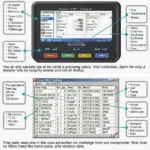OBD2 mpg calculation allows you to track your vehicle’s fuel economy in real-time. Understanding how your OBD2 scanner calculates MPG can help you identify ways to improve your driving habits and save money on gas. This article will delve into the intricacies of OBD2 mpg calculation, explore its benefits, and provide practical tips for maximizing fuel efficiency.
How Does an OBD2 Scanner Calculate MPG?
Your OBD2 scanner taps into your vehicle’s onboard computer, accessing a wealth of data from various sensors, including the mass air flow (MAF) sensor, manifold absolute pressure (MAP) sensor, engine speed sensor, and fuel injector pulse width. These data points are crucial for calculating MPG. The formula itself is relatively simple: MPG = Distance Traveled / Fuel Consumed. The OBD2 scanner calculates the fuel consumed based on the injector pulse width and the distance traveled based on the speed sensor.
Understanding the Factors Influencing OBD2 MPG Calculation
Several factors can influence the accuracy of your OBD2 mpg calculation. Tire pressure, driving style, and even external temperature can play a role. Maintaining proper tire inflation is crucial, as under-inflated tires increase rolling resistance and reduce fuel economy. Aggressive driving, with rapid acceleration and hard braking, also negatively impacts MPG.
Why is OBD2 MPG Calculation Important?
Real-time MPG tracking empowers you to identify fuel-wasting habits and make necessary adjustments. Beyond personal savings, monitoring fuel consumption can also indicate potential vehicle problems. A sudden drop in MPG could signal a malfunctioning oxygen sensor or a clogged air filter.
Utilizing OBD2 MPG Data for Improved Fuel Efficiency
Armed with real-time MPG data, you can experiment with different driving techniques to optimize fuel economy. Try smoother acceleration and braking, maintaining a consistent speed, and avoiding excessive idling. You can also use your OBD2 scanner to monitor fuel consumption during different routes and traffic conditions.
Improving Your OBD2 MPG Calculation Accuracy
While OBD2 scanners offer valuable insights, remember that their calculations are estimations. For the most accurate MPG readings, reset your trip odometer and fuel gauge when you fill up your tank. Then, compare the MPG displayed by your OBD2 scanner with the actual MPG calculated manually after your next fill-up. This method helps identify any discrepancies and allows for calibration.
Common Misconceptions About OBD2 MPG Calculation
One common misconception is that all OBD2 scanners calculate MPG identically. However, different scanners may use slightly different algorithms, leading to variations in readings. Another misconception is that the OBD2 MPG reading is always perfectly accurate. While generally reliable, various factors can influence the readings.
“Accurate obd2 mpg calculation is essential for understanding your vehicle’s fuel economy. Regular monitoring allows you to pinpoint inefficiencies and adjust your driving style for optimal performance.” – Dr. Emily Carter, Automotive Engineer
Conclusion
OBD2 mpg calculation provides a valuable tool for understanding and improving your vehicle’s fuel efficiency. By utilizing the data provided by your scanner, you can make informed decisions about your driving habits and maintenance needs, ultimately saving money and reducing your environmental impact. Understanding the factors influencing these calculations and employing best practices for accurate readings will maximize the benefits of this technology.
FAQ
- How often should I check my OBD2 MPG? Regularly checking, even daily, can help you quickly identify changes in fuel economy.
- Can I rely solely on my OBD2 scanner for MPG calculations? While valuable, it’s good practice to compare it with manual calculations for optimal accuracy.
- What can cause inaccurate OBD2 MPG readings? Factors like tire pressure, driving style, and even external temperature can influence the readings.
- Does my driving style really impact my MPG? Absolutely! Aggressive driving significantly reduces fuel efficiency.
- How can I improve the accuracy of my OBD2 MPG calculations? Regularly compare your scanner’s readings with manually calculated MPG and ensure proper tire inflation.
- Can an OBD2 scanner diagnose car problems related to fuel efficiency? Yes, a sudden drop in MPG can indicate potential issues like a faulty oxygen sensor.
- Are all OBD2 scanners the same in terms of MPG calculation? No, different scanners may use slightly varying algorithms, leading to some differences in readings.
Common Scenarios:
- Scenario 1: Noticeably lower MPG after a long highway trip. This could be due to higher speeds or strong headwinds.
- Scenario 2: Sudden drop in MPG in city driving. This could indicate a problem with the vehicle, like a clogged air filter.
- Scenario 3: Consistent high MPG. This suggests efficient driving habits and a well-maintained vehicle.
Further Exploration:
Consider exploring related articles on our website, such as “Felipe Morales OBD2 MPG” for more insights into optimizing fuel efficiency. You can also check out “Best App OBD2 Android” for mobile solutions to monitor your MPG. Finally, “OBD2 Scanner Fuel Consumption” offers a deeper dive into the topic of fuel economy tracking.
Need help? Contact us via WhatsApp: +1(641)206-8880, Email: [email protected] or visit us at 789 Elm Street, San Francisco, CA 94102, USA. We offer 24/7 customer support.
